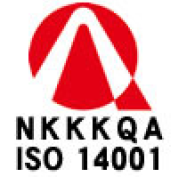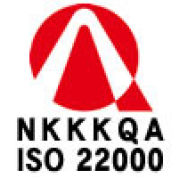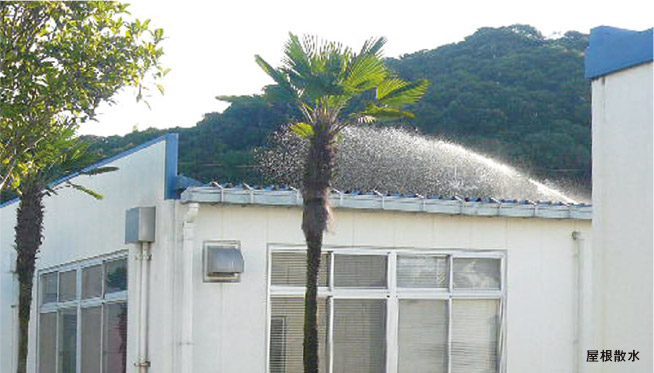International & Domestic Standards
ISO14001

Environmental Management System
ISO 14001 is a set of standards established by the International Organization for Standardization (ISO) for the environmental management of companies and organizations. It is a global standard helping companies and organizations reduce their environmental impact and manage their activities from the perspective of global environmental protection. We were certified in March of 2002. (Verifier: Nippon Kaiji Kentei Quality Assurance Ltd. (NKKKQA))
ISO22000

Food Safety Management System
ISO 22000 is an international standard for production, distribution, and sale of safe food products. We were certified in December 2005. (Verifier: Nippon Kaiji Kentei Quality Assurance Ltd. (NKKKQA))
Meat processing plant for export
USDA (HACCP system)
HACCP is a hygiene management system that continuously monitors and records important points to prevent hazards in all processes from the receipt of raw material to production and shipping.
For our domestic supply, our company is able to provide beef produced under the hygiene standards of the USDA (United States Department of Agriculture) HACCP system, which is considered to be the world’s most stringent.
We are the fourth company in Japan to be certified to export beef to the United States.
Dates each facility acquired the certification
Ariake Meat Plant
| Acquired | Exports Start | Facility |
|---|---|---|
| February 1998 | December 2009 | Pork processing facility for exporting to Hong Kong |
| December 2002 | May 2006 | Beef processing facility for exporting to the US |
| April 2006 | August 2007 | Beef processing facility for exporting to Canada |
| March 2007 | May 2007 | Beef processing facility for exporting to Hong Kong |
| May 2009 | May 2009 | Beef processing facility for exporting to Singapore |
| October 2009 | July 2010 | Beef processing facility for exporting to Macau |
| November 2009 | January 2010 | Beef processing facility for exporting to Thailand |
| April 2012 | June 2012 | Pork processing facility for exporting to Singapore |
| March 2014 | May 2014 | Pork and beef processing facilities for exporting to Viet Nam |
| March 2014 | September 2014 | Beef processing facility for exporting to New Zealand |
| June 2014 | June 2014 | Beef processing facility for exporting to EU |
| December 2014 | Beef processing facility for exporting to Mexico | |
| March 2015 | June 2015 | Pork processing facility for exporting to Taiwan |
| September 2015 | Beef processing facility for exporting to the Philippines | |
| October 2015 | Beef processing facility for exporting to Myanmar | |
| December 2016 | April 2017 | Beef processing facility for exporting to Brazil |
| September 2017 | October 2017 | Beef processing facility for exporting to Taiwan |
| June 2018 | July 2018 | Beef processing facility for exporting to Australia |
| June 2018 | July 2018 | Beef processing facility for exporting to Argentina |
| February 2019 | Beef processing facility for exporting to Russia | |
| March 2019 | Beef processing facility for exporting to Uruguay |
Kirishima Meat Plant
| Acquired | Exports Start | Facility |
|---|---|---|
| June 2012 | October 2012 | Pork processing facility for exporting to Hong Kong (Export of domestic pork offal products starts) |
| March 2014 | Pork processing facility for exporting to Viet Nam | |
| January 2015 | Beef processing facility for exporting to Viet Nam | |
| October 2015 | Beef processing facility for exporting to Myanmar |
Pork Export Performance
| Fiscal year | Export amount |
|---|---|
| FY 2012 (April to September) | 75.9 tons (including those exported to Hong Kong) |
| FY 2013 | 307 tons |
| FY 2014 | 340 tons |
| FY 2015 | 350 tons |
| FY 2016 | 502 tons |
| FY 2017 | 529 tons |
| FY 2018 | 400 tons |
Wagyu Beef Export Performance
| Fiscal year | Export amount |
|---|---|
| FY 2006 | 31 tons |
| FY 2007 | 79 tons |
| FY 2008 | 68 tons |
| FY 2009 | 82 tons |
| FY 2010 | 126 tons |
| FY 2011 | 81 tons |
| FY 2012 | 161 tons |
| FY 2013 | 180 tons |
| FY 2014 | 200 tons |
| FY 2015 | 206 tons |
| FY 2016 | 309 tons |
| FY 2017 | 450 tons |
| FY 2018 | 500 tons |
| FY 2019 | 237 tons |
- As of April 2019, 340 farmers had been registered as designated export beef producers.
- Preoperative and operative inspection is carried out daily by a meat hygiene inspector appointed by Kagoshima Prefectural Government. Monthly inspection is carried out by food sanitation specialists of the Ministry of Health, Labor and Welfare, and inspectors of FSIS (Food Safety and Inspection Service of the United States) and other exporting countries conduct inspections every three years.
- Except for those for meat processing facilities for exports, each of various standards is subject to regular re-accreditation annually.
Kagin Environmental Rating
Rating: S (advanced)
Rating details: From the perspective of providing safe and secure food products, we practice environmentally friendly management throughout our processes from manufacturing to distribution.
With the acquisition of ISO 14001 and ISO 22000 certifications, we have further enhanced our positive endeavors regarding quality and the environment.
- While our production activities are expanding thanks to the additional construction of our plants, we are working to reduce the environmental burden by introducing equipment which takes account of the rationalization of energy use.
*Kagin Environmental Rating, covering all businesses, provides “environmental rating” by quantifying the objective evaluation of a company’s efforts on environmental issues both from qualitative and quantitative aspects.


